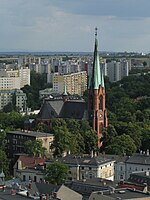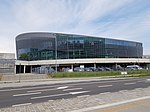2010 Central European floods
2010 floods in EuropeGenoa lowsJune 2010 events in EuropeMay 2010 events in Europe

The 2010 Central European floods were a devastating series of weather events which occurred across several Central European countries during May and June 2010. Poland was the worst affected. Austria, the Czech Republic, Hungary, Slovakia and Serbia were also affected. At least thirty-seven people died in the floods and approximately 23,000 people were evacuated. The city of Kraków declared a state of emergency. The floods forced the closure and relocation of items from the Auschwitz concentration camp museum. On 20 May, aid began arriving to Poland from several European Union countries.
Excerpt from the Wikipedia article 2010 Central European floods (License: CC BY-SA 3.0, Authors, Images).2010 Central European floods
Prymasa Stefana Wyszyńskiego, Gliwice
Geographical coordinates (GPS) Address Nearby Places Show on map
Geographical coordinates (GPS)
| Latitude | Longitude |
|---|---|
| N 50.294492 ° | E 18.67138 ° |
Address
Prymasa Stefana Wyszyńskiego
Prymasa Stefana Wyszyńskiego
44-100 Gliwice (Śródmieście)
Poland
Open on Google Maps










